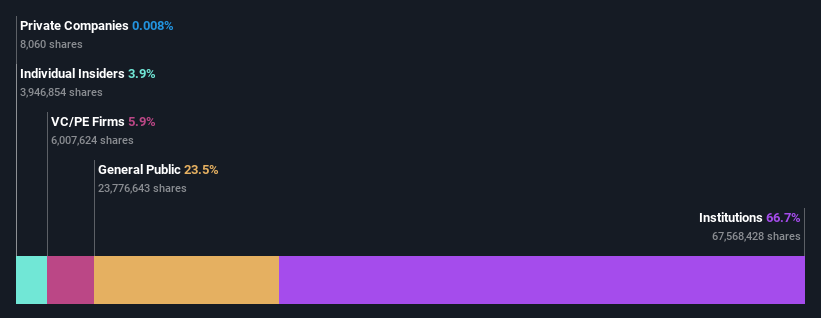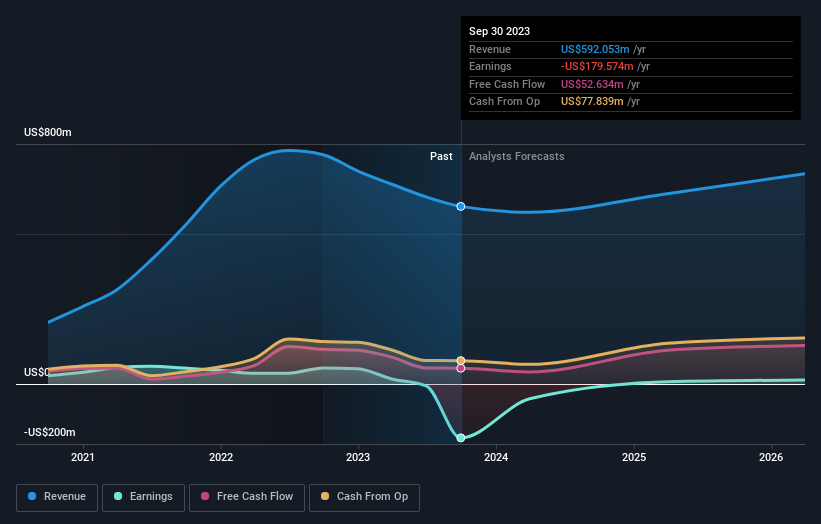Digital Turbine, Inc. (NASDAQ:APPS) is largely controlled by institutional shareholders who own 67% of the company
Key Insights
Given the large stake in the stock by institutions, Digital Turbine's stock price might be vulnerable to their trading decisions
A total of 12 investors have a majority stake in the company with 50% ownership
Using data from analyst forecasts alongside ownership research, one can better assess the future performance of a company
Every investor in Digital Turbine, Inc. (NASDAQ:APPS) should be aware of the most powerful shareholder groups. And the group that holds the biggest piece of the pie are institutions with 67% ownership. Put another way, the group faces the maximum upside potential (or downside risk).
Since institutional have access to huge amounts of capital, their market moves tend to receive a lot of scrutiny by retail or individual investors. Hence, having a considerable amount of institutional money invested in a company is often regarded as a desirable trait.
Let's take a closer look to see what the different types of shareholders can tell us about Digital Turbine.
See our latest analysis for Digital Turbine
What Does The Institutional Ownership Tell Us About Digital Turbine?
Institutional investors commonly compare their own returns to the returns of a commonly followed index. So they generally do consider buying larger companies that are included in the relevant benchmark index.
We can see that Digital Turbine does have institutional investors; and they hold a good portion of the company's stock. This implies the analysts working for those institutions have looked at the stock and they like it. But just like anyone else, they could be wrong. If multiple institutions change their view on a stock at the same time, you could see the share price drop fast. It's therefore worth looking at Digital Turbine's earnings history below. Of course, the future is what really matters.
Since institutional investors own more than half the issued stock, the board will likely have to pay attention to their preferences. Hedge funds don't have many shares in Digital Turbine. Looking at our data, we can see that the largest shareholder is BlackRock, Inc. with 14% of shares outstanding. Meanwhile, the second and third largest shareholders, hold 12% and 5.9%, of the shares outstanding, respectively. Furthermore, CEO William Stone is the owner of 1.7% of the company's shares.
After doing some more digging, we found that the top 12 have the combined ownership of 50% in the company, suggesting that no single shareholder has significant control over the company.
Researching institutional ownership is a good way to gauge and filter a stock's expected performance. The same can be achieved by studying analyst sentiments. There are a reasonable number of analysts covering the stock, so it might be useful to find out their aggregate view on the future.
Insider Ownership Of Digital Turbine
The definition of an insider can differ slightly between different countries, but members of the board of directors always count. Company management run the business, but the CEO will answer to the board, even if he or she is a member of it.
Insider ownership is positive when it signals leadership are thinking like the true owners of the company. However, high insider ownership can also give immense power to a small group within the company. This can be negative in some circumstances.
Our most recent data indicates that insiders own some shares in Digital Turbine, Inc.. As individuals, the insiders collectively own US$27m worth of the US$692m company. This shows at least some alignment. You can click here to see if those insiders have been buying or selling.
General Public Ownership
The general public, who are usually individual investors, hold a 23% stake in Digital Turbine. While this group can't necessarily call the shots, it can certainly have a real influence on how the company is run.
Private Equity Ownership
With a stake of 5.9%, private equity firms could influence the Digital Turbine board. Some might like this, because private equity are sometimes activists who hold management accountable. But other times, private equity is selling out, having taking the company public.
Next Steps:
It's always worth thinking about the different groups who own shares in a company. But to understand Digital Turbine better, we need to consider many other factors. For instance, we've identified 1 warning sign for Digital Turbine that you should be aware of.
Ultimately the future is most important. You can access this free report on analyst forecasts for the company.
NB: Figures in this article are calculated using data from the last twelve months, which refer to the 12-month period ending on the last date of the month the financial statement is dated. This may not be consistent with full year annual report figures.
Have feedback on this article? Concerned about the content? Get in touch with us directly. Alternatively, email editorial-team (at) simplywallst.com.
This article by Simply Wall St is general in nature. We provide commentary based on historical data and analyst forecasts only using an unbiased methodology and our articles are not intended to be financial advice. It does not constitute a recommendation to buy or sell any stock, and does not take account of your objectives, or your financial situation. We aim to bring you long-term focused analysis driven by fundamental data. Note that our analysis may not factor in the latest price-sensitive company announcements or qualitative material. Simply Wall St has no position in any stocks mentioned.


